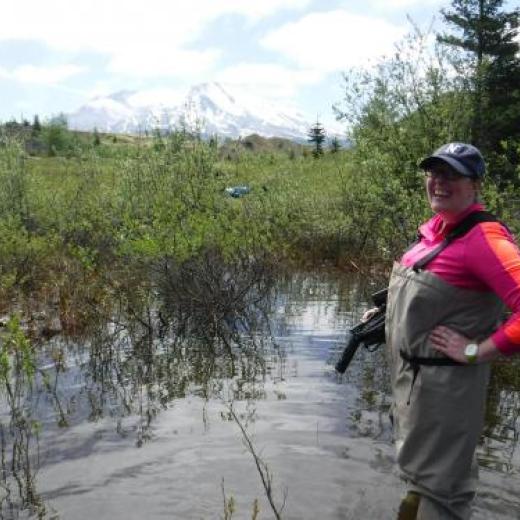Angela Strecker
About
I am the Director of the Institute for Watershed Studies and faculty in the Department of Environmental Sciences at Western Washington. Prior to arriving at WWU, I was faculty in the Department of Environmental Science and Management at Portland State University and Director of the Center for Lakes and Reservoirs. I completed my Bachelor of Science degree with Honours in Biology at the University of Regina and a Ph.D. at Queen's University in Biology, and was awarded two National Science and Engineering Research Council scholarships during my graduate degree. I completed two Post-Doctoral Fellowships, one at the University of Toronto in the Department of Ecology and Evolutionary Biology, and a second at the University of Washington in the School of Fisheries and Aquatic Sciences. I have published 30+ peer-reviewed research articles, two book chapters, numerous reports, and >60 conference presentations. I have received grants from the National Science Foundation, Bonneville Power Administration, Washington Department of Fish and Wildlife, US Army Corps of Engineers, Oregon Sea Grant, the National Landscape Conservation Cooperative, and the North Coast and Cascades Science and Learning Network. I am also an Associate Editor at the journal Aquatic Sciences.
Education
Research Interests
My research interests fall into several interconnected categories that revolve around the basic question of what influences biodiversity and ecosystem function at different spatial scales. To do this, my lab studies anthropogenic stressors in freshwater ecosystems, such as invasive species, climate change, habitat connectivity, and contaminants. Our unit of study ranges from genes to populations to communities to entire food webs. Ultimately, this work leads to the question of how ecosystem functions and services may be affected by human activities. In general, we use the combined approach of field surveys, small-scale and large-scale experiments, and statistical modeling to test our hypotheses. We also collaborate with social scientists to better understand complex socio-ecological systems.
Publications
Since 2019 (*student authors)
Murphy, C.A.*, A.M.M. Pollock, A. Strecker, S.L. Johnson. 2023. Minimal diel vertical migration and consistent zooplankton capturability in low productivity reservoirs, Oregon. Journal of Plankton Research 45:129-143.
Juetten, K.*, A.L. Strecker, A. Harrison, Z. Landram, W.J. De Bruyn, and C. Clark. 2022. Optical characterization of chromophoric dissolved organic matter in low and high elevation lakes in the Pacific Northwest region, USA. Earth and Space Science 9: e2022EA002503, https://doi.org/10.1029/2022EA002503
Gantz, C.*, R. Miller, S. Wells, M.D. Sytsma, A.L. Strecker. 2022. Mussel squeeze: Dissolved oxygen and temperature can “squeeze” zebra mussels out of invaded reservoirs. Management of Biological Invasions, in press.
Holgerson, M., M. Barnard*, B. Ahn*, M.P. Hayes, A.L. Strecker. 2022. Freshwater floodplain habitats buffer native food webs from negative effects of nonnative centrarchids and bullfrogs. Freshwater Science 41: 327-341.
McGann, B.N.*, A.L. Strecker. 2022. Coherent recovery of zooplankton to whole-lake disturbance but variation by functional group. Ecosphere 13: e3983.
Kuehne, L.M., R.J. Rolls, K. J. Brandis, K. Chen, K. M. Fraley, L.K. Frost, S.S. Ho, E.H. Kunisch, S.D. Langhans, C.J. LeRoy, G. McDonald, P.J. McInerney, K.R. O’Brien, A.L. Strecker. 2022. Benefits of permanent adoption of virtual conferences for conservation ecology and ecologists. Conservation Biology https://doi.org/10.1111/cobi.13884
Chiapella, A.M.*, C. Eagles-Smith, A.L. Strecker. 2021. From forests to fish: Mercury in mountain lake food webs influenced by factors at multiple scales. Limnology and Oceanography 66:1021-1035
Chiapella, A.M.*, M. Kainz, A.L. Strecker. 2020. Fatty acid stable isotopes add clarity, but also complexity, to tracing energy pathways in aquatic food webs. Ecosphere, in press.
Loewen, C., A.L. Strecker, B. Gilbert, D. Jackson. 2020. Climate warming moderates the impacts of introduced sportfish on prey biodiversity. Global Change Biology 26:4937-4951.
Kuehne, L., A.L. Strecker, and J.D. Olden. 2020. Knowledge exchange and social capital for freshwater ecosystem assessments. BioScience 70: 174–183.
Holgerson, M., A. Duarte, M. Hayes, M. Adams, J. Tyson, K. Douville, and A.L. Strecker. Floodplains provide important amphibian habitat despite facing multiple ecological threats. Ecosphere 10: e02853
Moser, K., J. Baron, J. Brahney, I. Oleksy, J. Saros, E. Hundey, S. Sadro, J. Kopacek, M. Kainz, A. Strecker, et al. Mountain lakes: Eyes on global environmental change. Global and Planetary Change 178: 77-95.
Jordan, M.P.*, A.R. Stewart, C.A. Eagles-Smith, A.L. Strecker. 2019. Nutrients mediate the effects of temperature on methylmercury concentrations in freshwater zooplankton. Science of the Total Environment. 667: 601-6.
Lockwood, J.L., D.J. Welbourne, C. Romagosa, P. Cassey, N.E. Mandrak, A.L. Strecker, B. Leung, O.C. Stringham, B. Udell, D.J. Episcopio-Sturgeon, M.F. Tlusty, J. Sinclair, M. Springborn, E.F. Pienaar, and A. Rhyne. 2019. When pets become pests: The role of the exotic pet trade in producing invasive vertebrate animals. Frontiers in Ecology and the Environment. 17:323-330.
Teaching Schedule
Fall ESCI 501: Research in Environmental Science
Winter ESCI 340: Biostatistical Analysis
Spring ESCI 4/597P: Invasive Species Ecology and Management
